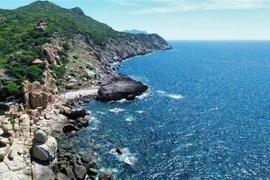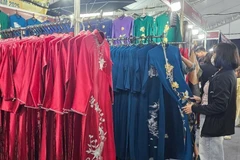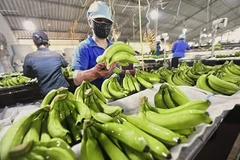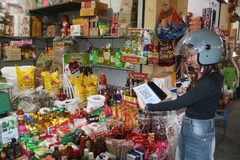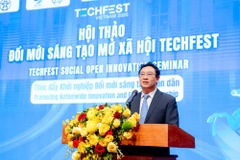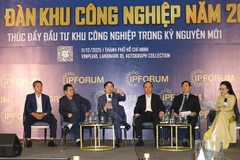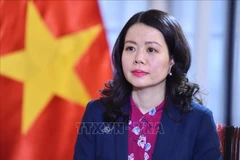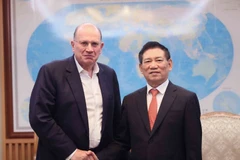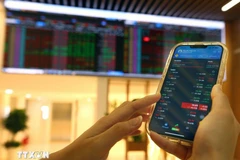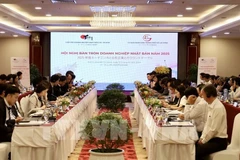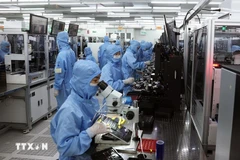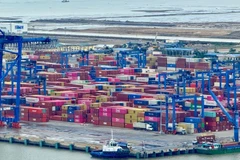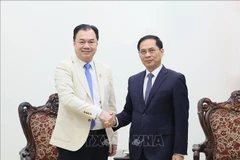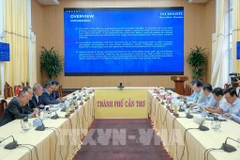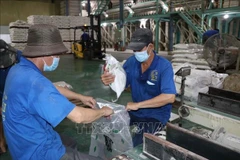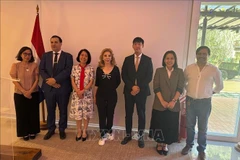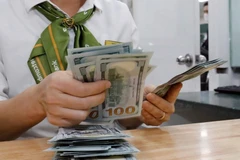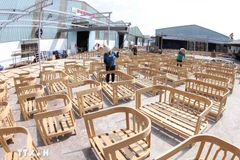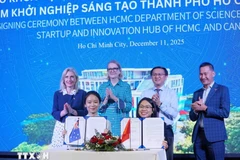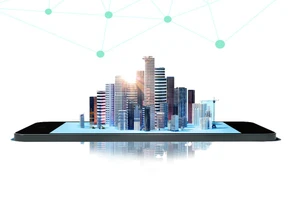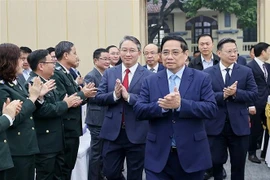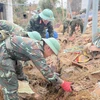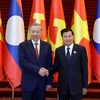Hanoi (VNA) – Ambassador Olivier Poivre d'Arvor, Special Envoy of the French President for the Polar Regions and Oceans, has highlighted Vietnam’s vast ocean potential, and France is fully prepared to partner with the country to harness this advantage and elevate its status on the global maritime stage.
France, once a pioneer during the Age of Discovery, continues to uphold its responsibility as a sea-faring nation in the 21st century. The country remains committed to collaborating with other nations to address ocean-related issues, which are intrinsically tied to the future of humanity.
On the occasion of Vietnam and France inaugurating their first-ever dialogue on ocean and maritime issues, scheduled for December 18, VietnamPlus held an interview with the Ambassador to gain insights into ocean protection and sustainable development, providing Vietnam with invaluable experiences to expedite its journey towards becoming a maritime power in its own right.
Vietnam’s vast potential for ocean development
- First, Ambassador, could you elaborate on the significance of your visit to Vietnam as the Special Envoy of French President Emmanuel Macron?
Ambassador Olivier Poivre d'Arvor: I am here in Vietnam because I see the country holds tremendous ocean potential.
Oceans represent a vast economic resource with significant untapped potential. While some countries have coastlines as short as 50km, Vietnam boasts a coastline of over 3,260 km, offering vast opportunities for exploration and development. There is much that we can share with each other regarding our oceans.
Regarding ocean issues, coastlines play a crucial role in everyday activities such as sourcing food for locals. Furthermore, maritime spaces can serve new purposes, such as undersea cables and offshore wind energy. France is a major maritime power with a long coastline, possessing a wealth of experience to share with Vietnam.
Therefore, President Emmanuel Macron has appointed me as his special envoy for the first-ever ocean dialogue. Specifically, tomorrow morning on December 18, we will inaugurate this dialogue mechanism, with the ambition to hold this forum annually. Both sides hope to engage in discussions on ocean-related issues, as well as relevant security and legal matters.
- We understand that in June 2025, France and Costa Rica will co-host the UN Ocean Conference in Nice. What does France expect from participating countries in terms of ocean protection and sustainable development?
Ambassador Olivier Poivre d'Arvor: Ten years ago in 2015, the 21st Conference of the Parties to the UN Framework Convention on Climate Change (COP21) was held, and we hope that a decade later in 2025, we will organise an ocean conference to continue the momentum and create widespread peace centred around the theme of the ocean.
As we know, the climate issue still faces many challenges, as there is no immediate solution to fully address it, other than adapting to the current situation. In contrast, the ocean fundamentally offers a realm of opportunities, potentials and solutions, from bolstering food security to sparking health-conscious products and new innovations. Therefore, we hope for positive changes in ocean governance, leading to a peaceful global impact.
With this goal in mind, France hopes that countries with a special stake in ocean affairs will join our upcoming conference. We aim to invite around 100 heads of state and government leaders to the event, including those from Vietnam.
We also hope that Vietnam will play an important role in this event. In the coming days, Prime Minister Pham Minh Chinh will receive an official invitation from President Emmanuel Macron to attend as a guest of honour. This will also be an opportunity for Vietnam to voice its perspective, demonstrate its vision, and underscore the importance of the sea and oceans in Vietnam's future development.
Shaping a digital model for the oceans
- With Vietnam’s attendance at the UN Ocean Conference in Nice, what new cooperative ventures can we expect to see between Vietnam and France in the realm of ocean protection and sustainable development?
Ambassador Olivier Poivre d'Arvore: It is often said that we know more about the Moon than we do about our own oceans. This is why cooperation is vital to deepen our understanding and protect these vast ecosystems. Our partnership with Vietnam holds certain advantages. For instance, the University of Science and Technology of Hanoi, established through an inter-governmental agreement in 2009, hosts numerous French scientists, lecturers and ocean experts.
In addition, we hope to cooperate in further utilising France's ocean exploration vessels to gather data on Vietnam's maritime zones. Therefore, we would like Vietnam to join the international scientific committees to contribute to a more detailed understanding of the current state of the oceans. Through the activities of this committee, periodic reports on the ocean situation will be produced, allowing policymakers to fully grasp the state of the oceans.
- According to you, what is the role of ocean environmental protection initiatives in sustainable economic development in Vietnam and other developing countries?
Ambassador Olivier Poivre d'Arvore: In this matter, I would like to stress the risk of rising sea level, which affects all coastal or low-lying areas. In Vietnam, the Mekong Delta, barely a metre above sea level, is highly vulnerable. About 20 million residents in this area are directly at risk. Many countries around the world are also suffering from this issue.
Therefore, within the framework of the Ocean Conference slated for June 2025, we will organise the first-ever summit of delta regions around the world and coastal areas threatened by sea level rise. We hope to gather around 500 policymakers and leaders from the affected regions to meet, exchange ideas, and find solutions to address this critical issue together.
Sustainable development models in coastal areas
- As Vietnam amplifies its sustainable development initiatives, how can France support in terms of technology and policy to address marine pollution and manage ocean resources?
Ambassador Olivier Poivre d'Arvore: Today, many challenges require solutions involving digital technology, digitisation and informatics. That’s why, at the upcoming Ocean Conference, we aim to pioneer global digital models of the oceans. Based on updated scientific data, we will create models to track ocean currents, the movements of marine life, and even waste or pollution sources. This will help us promptly understand the current state of the seas and oceans.
We plan this as a project funded by the European Commission, offering free access to all participating countries. Through this model, we can obtain detailed information about the oceans without the need for physical exploration under the sea.
- In fact, economic development and environmental protection can sometimes conflict. How can nations strike a balance between economic growth and the preservation of marine and ocean ecosystems?
Ambassador Olivier Poivre d'Arvore: We are aware that Vietnam's National Marine Spatial Planning has a long-term vision for the next two decades. Such a long-term outlook helps limit short-term objectives and aligns with Vietnam’s prioritisation of economic growth to become a strong partner of global powers. However, when working toward a long-term vision, we cannot focus solely on immediate outcomes; instead, we must ensure resources are renewable, sustainable, and exploitable over the long term. Thus, I believe it is crucial to simultaneously address both conservation and sustainable resource management for development.
For example, in the fisheries sector, we need to carefully calculate when and how much to harvest to ensure marine life can regenerate and ecosystems remain intact. In this context, the role of science is vital in helping us make informed decisions for sustainable long-term growth.
- Vietnam is rapidly developing its tourism and marine resource exploitation sectors. Could you share experiences or recommendations to ensure these industries grow sustainably without harming the environment in the future?
Ambassador Olivier Poivre d'Arvore: Regarding tourism, France welcomes around 100 million tourists annually, about half of whom (particularly younger visitors) travel to coastal areas. These tourists are often drawn to activities highlighting environmental preservation. A notable example involves the integration of tourism with traditional fishing. If we exploit marine resources continuously throughout the year, as in year-round fishing, fish stocks and marine resources will quickly be depleted, leaving nothing for future generations.
This reality highlights the need for a new development strategy, which includes seasonal fishing moratoriums. During these periods, we can combine tourism activities with fishermen’s livelihoods to sustain their income without harming marine ecosystems.
For instance, during the off-season when fishing is paused, tourists could visit coastal regions to experience and learn about fishing practices, such as how fish are caught or boats are built. This approach not only ensures income for fishermen but also educates visitors on sustainable fishing and marine conservation. I believe this is a smart tourism model that should be spread to foster long-term sustainable development.
Opportunities for Vietnam to become a strong maritime power
- In your opinion, what specific economic benefits could international cooperation on ocean and environmental protection bring to developing countries like Vietnam?
Ambassador Olivier Poivre d'Arvore: When we talk about the ocean, it is essential to understand that there is only one global ocean. This means that no single country can act as an exemplary protector while others fail to follow suit. Therefore, preventing pollution and environmental harm to the ocean requires collective action. Collaboration is crucial to ensure effective results.
For instance, in the Mekong Delta, while new policies have been undertaken to address challenges, it is still necessary to coordinate with upstream countries along the Mekong River. Such cooperation ensures that water flowing into the ocean is not polluted and that regional peace is maintained. To illustrate, consider the example of a shared apartment building. Harmonious cooperation and shared responsibility are needed between residents on the upper and lower floors to maintain balance and functionality.
- In recent years, the French Development Agency (AFD) has provided significant support for Vietnam in climate change adaptation, biodiversity protection and environment protection projects. Could you share the significance of this support?
Ambassador Olivier Poivre d'Arvore: AFD is one of our most effective cooperation institutions, operating on a large financial scale. Vietnam is also one of AFD's key partners. During the implementation of AFD projects, I have observed that the political relationship between Vietnam and France has played a significant role in driving these efforts forward.
In such spirit, we are delighted that a few months ago, Party General Secretary To Lam visited France, which highlighted the importance of the bilateral comprehensive strategic partnership. French President Emmanuel Macron also pledged and hoped that he would pay an official visit to Vietnam in the near future.
We also hope that the Vietnamese Prime Minister will lead a delegation to the UN Ocean Conference in Nice in June 2025. We are fully confident that on this basis, Vietnam will achieve strong progress and even gain experiences to share with us. In the near future, we anticipate Vietnamese experts travelling to France to share insights on developing coastal regions.
Furthermore, Vietnam has vast potential to develop its coastal areas, notably seaport projects in Hai Phong or Da Nang. These are areas where France can fully collaborate with Vietnam to help the country capitalise on its advantages and soon become a strong maritime power./.
Thank you very much!



